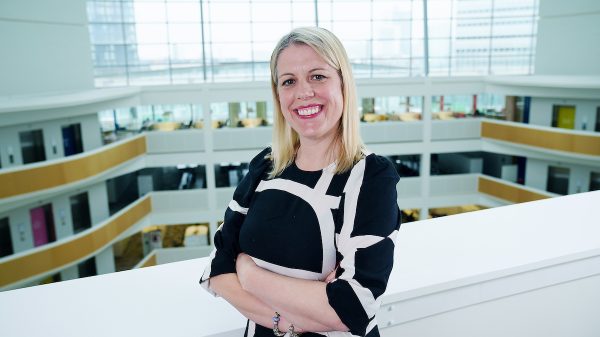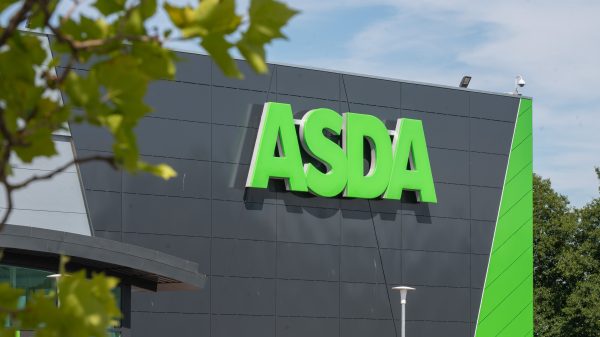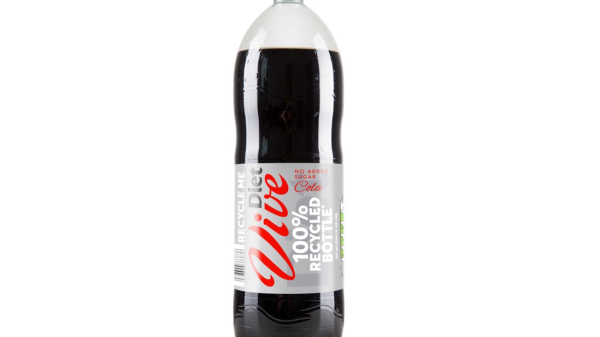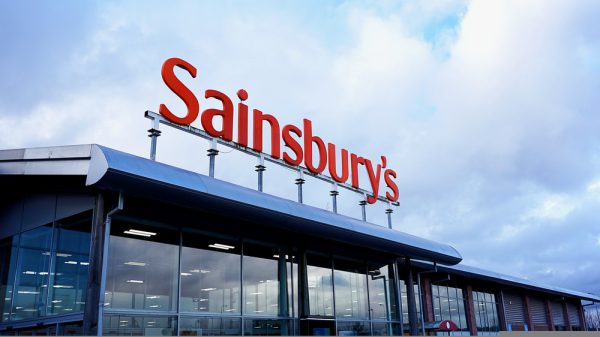From its origins as an online book store, Amazon has managed to conquer most categories.
However, grocery is an area it has not yet cracked.
Amazon first ventured into the world of grocery back in 2007 when it started selling food online in the US, a move it replicated in the UK in 2016.
Its ambitions were made clear with its 2017 acquisition of Whole Foods, followed by the roll out of physical grocery stores.
It only dipped its toes in the UK convenience store sector in 2021 with the launch of its Fresh sites.
Two years later, it has just 18 Amazon Fresh stores, the majority of which are in London.
And its expansion plans here – widely regarded as one of the most competitive grocery sectors in the world – have slowed.
We take a look at whether the grocery industry needs Amazon, if its technology is enough to entice shoppers, and if it can secure a long-term future.
The bold expansion plans of Amazon Fresh
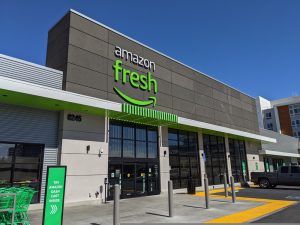
When Amazon first looked to make its mark on the UK grocery sector, it had its sights set on 260 UK convenience stores by the end of 2024.
However, this was soon put to a standstill in August last year as the retailer saw sales slow as a result of the cost-of-living crisis.
Just last week, Amazon announced that three of its London stores in Ealing, Wandsworth and East Sheen would be shutting their doors for good.
Amazon spokesperson, Lindsay Campbell says: “While we decided to close three Amazon Fresh stores, it doesn’t mean we won’t grow—this year. We will open new Amazon Fresh stores to better serve customers in the greater London area.
“We are committed to our investment in grocery, and as we grow we’ll continue to learn which locations and features resonate most with customers.”
Retail analyst Natalie Berg says that “a pause isn’t a bad thing”.
“It’s to be expected and means that Amazon is probably learning.”
“It’s also probably reflective of the current climate. Amazon is not immune to the challenges the rest of the industry is facing,” she explains.
However, Berg adds that over the past two years, its venture into grocery retailing has been “fairly underwhelming”.
Martin Heubel, director of Consulterce, a consultancy that specialises in helping CPG brands make sense of Amazon, argues that the store rollout was “stopped in its tracks”, not just because of the cost-of-living crisis, but also because it is “incredibly expensive to set up, open and run these shops in prime London locations”.
Subscribe to Grocery Gazette for free
Sign up here to get the latest grocery and food news each morning
Is grocery right for Amazon?
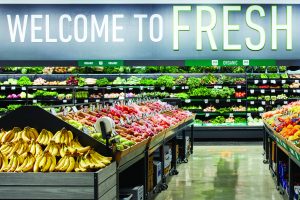
Last month, major investor Terry Smith, who owns British investment fund Fundsmith, told investors that he dumped its Amazon shareholding due to CEO Andy Jassy’s decision to expand further into grocery, which he said was “potential capital misallocation”.
While Berg doesn’t think that its venture into the industry was necessarily a mistake, she says that “Amazon needs grocery, but the grocery industry doesn’t need Amazon”.
“Grocery is a huge chunk of consumer spending,” she explains.
For Amazon, the push into the industry “is about locking shoppers into their wider ecosystem”.
“If they start shopping for Amazon groceries every week, they’re going to make Amazon their first port of call for everything else, and for that reason it won’t give up on grocery.”
Digital consultancy TWC development director Tom Fender says that Amazon was “always going to have a big job to break into the grocery market, as it is very advanced, sophisticated and competitive”.
He adds that timing hasn’t been helpful either, pointing out that it opened its first Fresh store in 2021 amid the pandemic when “there were and still are plenty of people working from home,” which has hindered sales.
Grocery retail expert Karen Green, author of Buyer-ology, argues that Amazon’s brand proposition is what is letting it down.
“I expect Amazon to bring items to me, rather than going to a store. And although Amazon Fresh says ‘fresh’, I’ve always known the brand as offering ambient.”
She adds that Amazon doesn’t have a huge differentiating factor from its competitors “other than the fact that they’ve got the technology”.
“When Aldi and Lidl came in, they had reason to be, they were discounters.”
Is the technology enough to draw in shoppers?
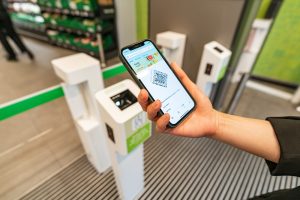
As Green says, Amazon Fresh stores certainly have technology. The online giant’s ‘Just Walk Out’ technology has shaken up the grocery industry, with shoppers able to pay for the groceries they pick up and take from store without scanning them, or queuing at a checkout.
Other supermarkets, including Aldi and Tesco have also piggybacked off the idea, opening their own ‘checkout free’ stores.
While Berg doesn’t think the sector “needs” Amazon, she says that the business can act as “a catalyst for change,” with its “tech prowess”.
“Amazon has tackled something that has largely been ignored in the industry for a very long time – the checkout.
“What Amazon does really well is finding a problem and improving it and I think it is quietly becoming the rails the sector runs on.
“They have the opportunity to help retailers enhance in-store experience and make their online operations more efficient.”
But that doesn’t necessarily mean it has the credentials to conquer grocery retail.
Berg says: “I think the fundamental question now is do they want to be a retailer? Or do they want to license their technology to the rest of the industry? I’m not sure Amazon even knows the answer to that.”
In the short term, Amazon has acted as a “catalyst for change,” as in May, London’s ExCeL centre adopted the tech giant’s technology at the exhibition centre’s new convenience store, ‘Market Express’.
While Berg commends the innovation, she argues that “it’s not really enough to get people through the door”.
“In grocery retailing it comes down to price or quality, and more often than not it comes down to proximity. Without much of a physical presence, Amazon can’t offer that.”
Heubel says that during the ongoing cost-of-living crisis, “the unique selling proposition of ‘Just Walk Out’ technology is not what customers are looking for”
Global Data lead retail analyst Nick Gladding agrees and is “unconvinced enough shoppers are sufficiently engaged by the Amazon Fresh concept to attract the footfall it needs to become viable when there are so many other competitors to choose from, as well as expanding quick commerce players”.
What does the future look like for Amazon Fresh?
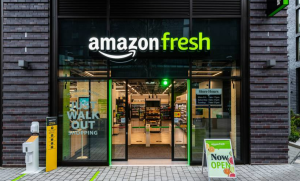
Despite the fact, Amazon has evidently found grocery retail challenging, Heubel believes it can crack this tricky sector – but only if it focuses on “customer centricity” and “meaningful differentiation”.
“Shoppers don’t want to spend more, and as a result, Amazon will have to focus on the needs of its actual customer base. But this need isn’t to focus on checkout-free stores, it’s to get a broad range of products at a great value.”
He adds that if the Just Walk Out technology isn’t resonating with shoppers, “the question really becomes why Amazon Fresh exists with physical stores in the first place”
“The easiest way to gain relevance and market share would be through a strategic acquisition,” he says.
Last month, speculation swirled that Amazon could make an 800p-a-share takeover bid for Ocado.
While that rumour has since died down, Heubel believes that this could have made sense, as the online-grocer has a “strong online positioning and scalable business model”.
Without an acquisition he says that “given the high cost of running the existing sites without a significant return in sales, I expect physical Fresh stores to disappear over the next 12 to 18 months and Amazon to refocus on its online grocery offering instead.”
Green agrees that an Ocado takeover would “fit like a glove”.
“It would be a very logical acquisition because people misconstrue Ocado as being retail, but its all about the technology and they have some intellectual property that could be useful for Amazon.”
While Gladding agrees that an acquisition is Amazon’s best bet, he says that if it had wanted to acquire the online supermarket, it would have pounced before now.
Although Berg also believes that “they’ll only make their mark if they acquire someone”, she says that Ocado might not be the best option as Amazon “absolutely needs physical stores”.
“The online grocery revolution failed to materialise. If a pandemic can’t convince shoppers to permanently make that switch to buying groceries online, I’m not sure what can.”
Fender says that Amazon’s move into grocery was an “ambitious” one, adding the tech giant now needs to “reflect and review” in order to push ahead with its bold expansion plan.
Whether by acquisition, or a refocus on what grocery shoppers want and need right now, big changes are needed it Amazon is to be something other than a bit-part player in UK grocery.






